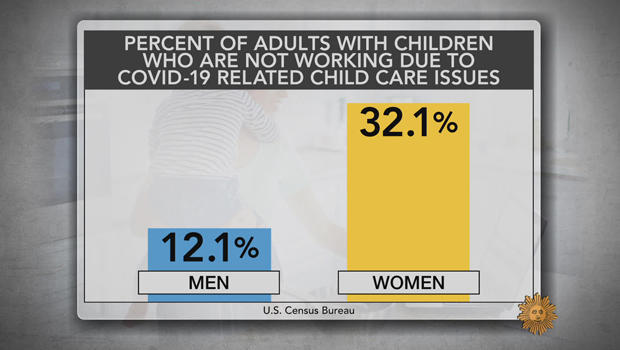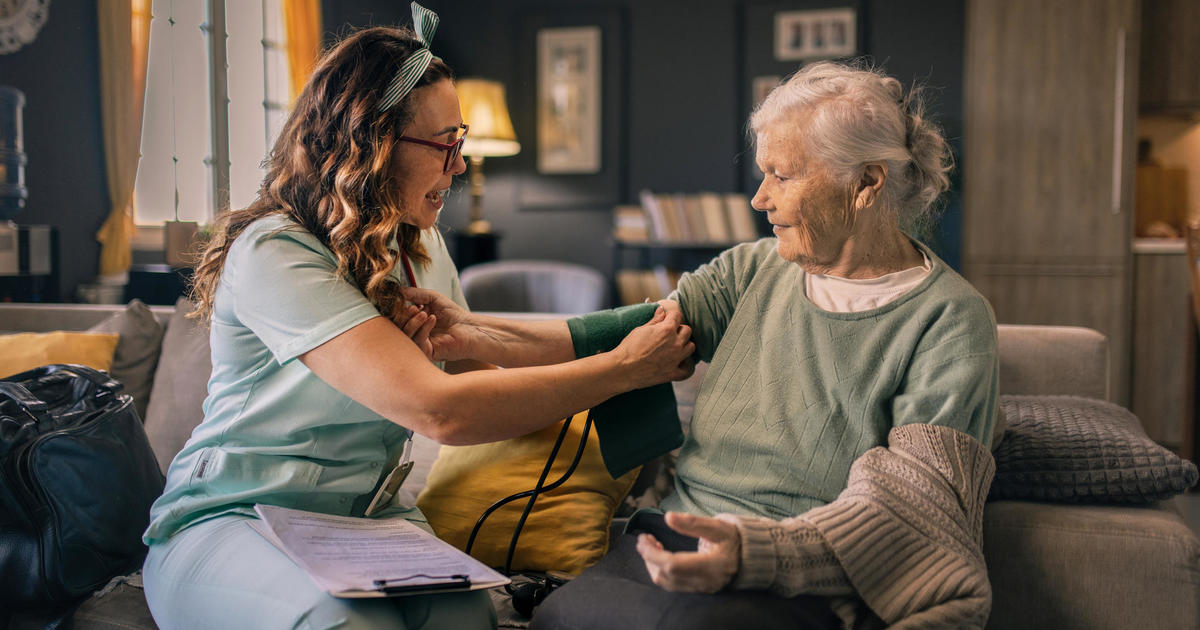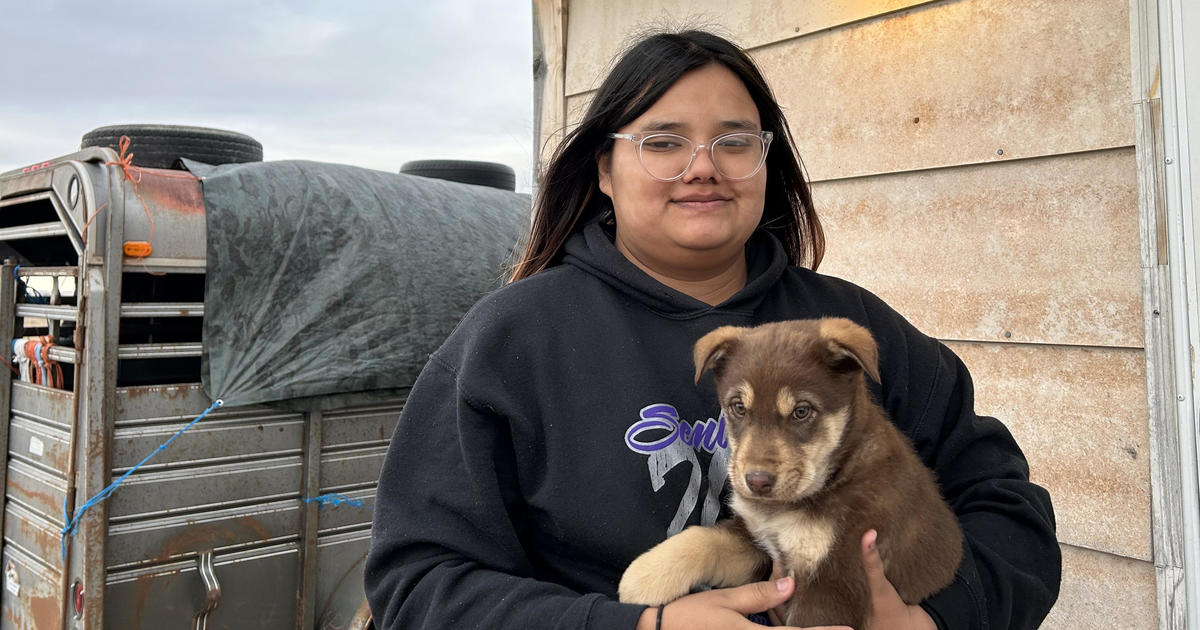Working mothers on the edge
For Clara Vazquez, a home health aide in the farming town of Sunnyside, Washington, the pandemic has created a new level of anxiety. "I'm here to take care of people that need me, but who can take care of my son?" she said. "I don't have no one."
She and her husband, Augustin, a long-haul truck driver, barely make ends meet. With school now online, they cannot afford a regular sitter for seven-year-old Kevin, and must rely on a patchwork of friends and family.
"One of the things that my son always says when he goes to bed is, 'Who's gonna watch me?' He worries, he can't sleep right because he doesn't know where he's going to be. So, it's heartbreaking to me, because there's days where I just say, 'I'm just going to see who answers me so I can drop you off.'"
Vazquez fears her son is falling behind in his school work, and yearns to be home to help.
Correspondent Rita Braver asked her, "Financially, how hard would it be for you, if you had to stop working?"
"It's just gonna leave us more into debt, and i just can't afford to leave my job," Vazquez replied. "Because if I do, I won't be able to pay my bills."
Professor Joan C. Williams, founding director of the Center for WorkLife Law at the University of California's Hastings College of Law, said that mothers are in an impossible situation: "They're doing their own job, their childcare worker's job, and their children's teacher's jobs."
Braver asked, "What's your call volume like now, during the pandemic, versus what it is in normal times?"
"Absolutely unbelievable," Williams replied. "We've had a 250% increase in people calling us."
Washington did provide some early relief for families, but many people were ineligible, and most of that money has already run out.
And while plenty of fathers are struggling, a new study shows that women are almost three times more likely than men not to be working due to childcare demands because of the pandemic.
Said Williams, "Fifty-seven percent of moms now report depression and anxiety compared to only a third of dads. Eighty percent of mothers now say they're doing most or all of the housework and home schooling."
"It's almost like people were just holding it together, and the whole infrastructure is crumbling," said Braver.
"You know, we were already in a crazy situation in the United States – I mean, we're the only industrialized nation with no paid parental leave," Williams said. "It was a Rube Goldberg machine from the beginning. And it just broke."
Williams says that many mothers are facing serious indifference or even hostility from employers. "All of them are feeling really, really embattled right now," she said.
Danielle Meah was working for a Fortune 50 institution, part of the leadership in that organization's cyber-security department. But it all collapsed in March. Meah's company told everyone to work from home. Because of COVID-19, her babysitter could not come to the house. Her husband helped, but has a high-pressure job, too.
Meah had most of the responsibility for baby Logan.
Braver asked, "How did the company react toward this circumstance that you were in?"
"I worked in a primarily male-dominated environment," Meah said. "I started noticing comments here and there that suggested people were not comfortable with it – you know, having the baby on a call with me or, like, bringing him onto a conference line would make people uncomfortable."
"Uncomfortable because they didn't like seeing a baby in a work environment?"
"I just kind of received veiled questions like, 'When does he eat?' or 'Does he ever sleep?' And I also felt bad because I wasn't dedicating the same amount of attention and care that I normally would to the staff or to the call or to the meeting 'cause I was preoccupied with him. It got tricky very quickly."
Soon, she found herself left out of key meetings: "And actually someone made that comment to me of, 'We're just not gonna invite you because you're off doing 'mommy duty,'" she said.
"Did you ever talk to superiors in the company and say, 'Look, I'm struggling here, can you give me some relief?'" asked Braver.
"I did," said Meah. "And the response was, 'You have to do these things or your career is in jeopardy.' And that, to me, felt like a threat."
She finally resigned.
"You couldn't struggle anymore?" Braver asked.
"Yeah. And that's what kills me, truly," said Meah. "This was a job I'd worked for for 10 years, minimum. I'd busted my butt to get there. I was bitter, I was really angry."
Meah was able to find a new family-friendly job, at a similar salary. But not everyone is so lucky.
Drisana Rios, who was an account executive at a San Diego insurance company, is now unemployed. "It's been a few months. And I've been looking every single week," she said.
Her company had switched to work-at-home just as her one- and four-year-old's preschool shut down. Her husband is an essential worker, gone all day. She said her manager immediately laid down the law: "He right away would say, 'I do not wanna hear the kids on client calls.' Yeah, he didn't wanna hear them on client calls, or see them, right? He would just question, you know, my availability, which I didn't understand, because I was available all the time."
Rios said a male colleague with children was treated differently. But no matter how hard she tried, she said, her boss would not let up: "And I said, 'What else do you want me to do? Do you want me to lock my one-year-old in a room on his own?' And he just responded, 'Figure it out.' And I was just crying. I'm like, 'OK.' So, I reported the discrimination to HR via email. And a week later they let me go. And I believe it is 100% retaliation for this, because I was doing my job."
Attorney Daphne Delvaux is suing on behalf of Rios. In its legal response, HUB International Insurance Services denies "each and every allegation" Rios makes, and says that she was let go for "legitimate ... business reasons…" including "failure to perform her job duties."
But Rios is part of a trend: the government just announced that 865,000 women left the workforce last month, versus 216,000 men.
Delvaux said, "You know, this virus doesn't just cause people to die, but it's actually killing the working mothers' careers," she told Braver. "I feel like women are being set back decades in their progress towards equality at work."
And mothers like Drisana Rios are sounding an alarm: "I don't ever want a mom to feel like I do, that they have to choose to either work and not have kids, or to be a stay-at-home mom. We could have both. We can be working mothers."
For more info:
- Joan C. Williams, director, Center for WorkLife Law, University of California's Hastings College of Law
- COVID-19 Helpline (Worklife Law)
- Daphne A.M. Delvaux, Gruenberg Law, San Diego
- momsrising.org
- A Better Balance
Story produced by Sari Aviv. Editor: Ed Givnish.





